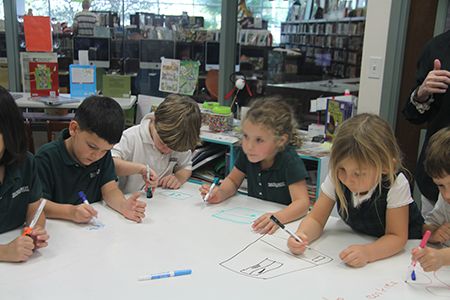

Becoming Problem Solvers
Source/Author: Mike Murphy, Headmaster
January 22, 2016
There are three kinds of people. (Not really, but a billion examples will not fit in the space I have!)
1. Those who see a problem and complain about it.
2. Those who see a problem and work to address it.
3. Those who do not see the problem.
I am not sure why anyone would want to be a #1 for long. A worthy complaint may free up tension and can help one clarify a concern, but after a while the complaining imprisons us. Nelson Mandella put it perfectly when he said, “As I walked out the door toward the gate that would lead to my freedom, I knew if I didn't leave my bitterness and hatred behind, I'd still be in prison.” The same goes for our personal and professional challenges. We can either let the problem paralyze us or we can find ways to improve the situation.
The #2’s of the world are the people we want our students, teachers and parents to be. It is one thing to know that a student is not doing his/her best and an entirely different thing to know how to support and inspire the child so he will move toward improvement. Master teachers and wise parents know how to develop plans. Clearly, teachers and parents need to be insightful enough to understand the child, or the plans will only create more complex issues for the child. Well educated students learn how to resolve problems. Whether the issue is academic, physical, social or emotional, we can learn methods to constructively address challenges and to become great problem solvers.
Problem solving is considered a higher ordered thinking skill because it does require planning and strategy, rather than a single focused emotional and limited response. High level problem solvers know how to gather information and people with various levels of experience to unite and develop possible solutions. Lack of information and isolation tend to lead to less than satisfactory solutions. That is why collaboration has become so important in the classroom and in the workplace.
There is a lot of chatter about collaboration being a 21st century skill. No doubt the work places that are collaborative are experiencing both success and workplace satisfaction. However, there is nothing new about the importance of parent-teacher-student collaboration. The importance of parents and teachers working as partners in the best interest of a child has a long and deep history. Progressive schools realize the importance and power of including students in the solution of their challenges. Obviously, teachers and parents need to determine whether our children are at an appropriate level of development to engage in finding a solution. When possible, the inclusion of students leads to greater independence and growth for the child.
Interestingly, there are people who do not see problems for a variety of reasons. At times we envy those people and on other occasions we pity them. On the positive side, I hope that our children are learning the difference between a problem and an annoyance. At the same time, I hope they are learning that they can make a difference and improve situations for themselves, their friends and the greater community.
Cheers!
Mike
























